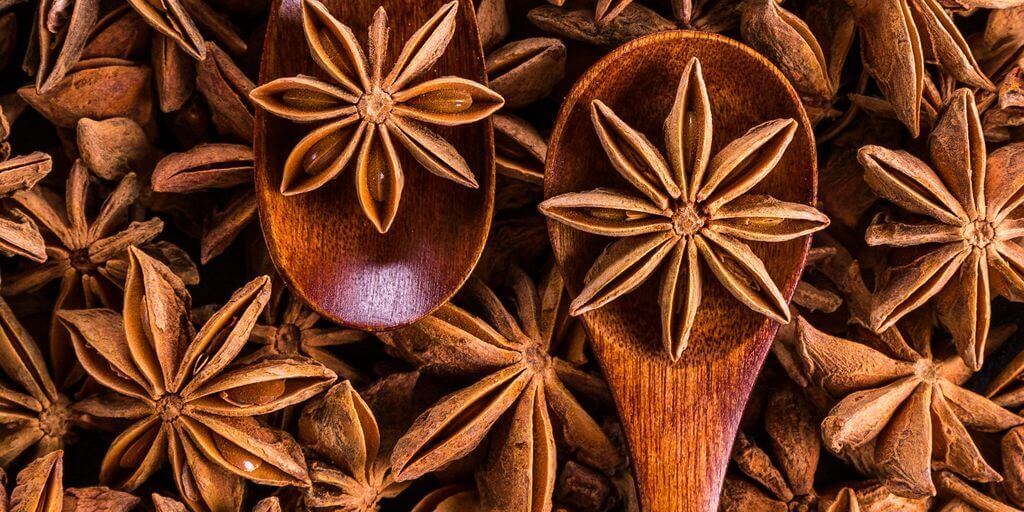Aniseed, also known as Anise, is a spice derived from the seeds of the Pimpinella anisum plant, which belongs to the Apiaceae family. It is known for its distinctive sweet, licorice-like flavor and aroma.
Throughout history, people have used Aniseed to treat a variety of ailments. The greenish seeds of the Pimpinella anisum were a highly-prized commodity in ancient Greece and Rome, and the seeds were so valuable in the East that they were often used to pay taxes. Today, the seeds continue to help people around the world with ailments ranging from digestive issues to low libido.
About the Aniseed Plant
The herbaceous Anise plant is a member of the Carrot family that can grow to heights of up to three feet. Thin, spindle-shaped roots produce grooved stems and leaves that form feathery lobes.
In July and August, the plant yields umbels of dainty yellow or white flowers with a delicately sweet aroma.
In late August to September, the plant produces small brown seeds known as “aniseed.” The plant is native to Egypt, Asia Minor, Crete and Greece but is now grown around the world in warm and favorable conditions.
Please note that even though Aniseed is sometimes called Anise, this is NOT the same as Star Anise, which are the seeds from the plant Illicium verum.
Active Ingredients of Aniseed
The seeds are composed of 18 percent proteins, eight to 23 percent fatty oils, two to seven percent essential oils, five percent starch, 22 to 28 percent N-free extracts and 12 to 25 percent crude fibre. The remaining nine to 13 percent of the seed’s weight is moisture.
Aniseeds are delightfully fragrant due to their high concentration of anethole, an essential oil. The seeds also contain other important compounds like acetophenone, p-anisaldehyde, anise alcohol, estragol, limonene and pinene.
Aniseed Health Benefits
The seeds are an excellent source of minerals such as:
iron, magnesium, calcium, manganese, zinc, potassium and copper.
These minerals are essential to cardiac, bone and blood health and are needed by the body to turn food into energy.
The B-complex vitamins found in aniseed are essential to overall health. Loaded with riboflavin, pyridoxine, niacin and thiamin, the seeds can contribute to healthy levels of neuro-chemicals in the brain.
Preparation of Aniseed
After being threshed from the plant, the seeds are dried in trays until they become greyish brown. Once dried, aniseeds can be ground into powder that has a long shelf life when stored in airtight containers in a cool space. A tea can be made by steeping the seeds in boiling water, but the ground seeds may also be taken dry.
Aniseed Uses
The seeds and the oil they produce contain thymol, terpineol and anethole, which can be used to treat pectoral affections and coughs.
When used as a lozenge, aniseed is an effective expectorant. Bronchial irritation can be soothed by drinking a tea made from the seeds, and people that suffer from spasmodic asthma may also find relief from the seeds.
Drops of aniseed oil may be used in a vaporizer to clear congestion and soothe coughing. Gargling with a tea made of the seeds can also provide relief for sore throat, laryngitis or pharyngitis.
The seeds have also been used to reduce flatulence, cure sleeplessness, aid nursing mothers with the production of milk and to stimulate appetite. Aniseed can also improve digestion, alleviate cramps and reduce nausea.
A paste made from the seeds may be applied to the forehead, neck or temples to relieve headaches and migraines. A similar paste can be used to treat lice and scabies.
Some components of aniseed are known to have calming effects that can relieve anxiety and nervousness. These components include thymol, stigmaterol, linalol, terpineol, alpha-pineno and eugenol.
Anise has aphrodisiac properties that can increase libido. Drinking one glass of water infused with the crushed seeds each night can increase one’s sex drive. The seed’s healing properties can also be yielded through external means like vaporization and pastes.
Shopping
| Visit the new SHOPPING page for a wide selection of amazing products! |
Always take care when taking herbs and Read Our Disclaimer.
Aniseed Herb Notes / Side Effects
Safety
While the seed has many benefits, high doses of the essential oil are toxic due to its narcotic properties. Anise is safe to use in small doses, but ingesting large amounts of the seed can cause convulsions, narcosis, circulatory problems and coma. Improper use may also cause seizures, paralysis, lack of clarity and other mental problems. Users should only take the seed as directed and avoid consuming high doses.



Leave a Reply